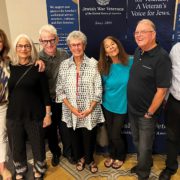NMAJMH Hosts Founder of the Jewish Museum of Florida
By Bryn Garick, Managing Editor
Marcia Jo Zerivitz, LHD spoke to JWV members during a National Museum of American Jewish Military History (NMAJMH) event at our National Convention in Jacksonville, Florida. Zerivitz is the Founding Executive Director of the Jewish Museum of Florida – FIU.
Zerivitz spoke on the contributions of Florida Jews in the Military and Jacksonville Jewish History.
“Thousands of Floridian Jews have served in the US military in all ranks: in the Army, Coast Guard, Marines, Navy, and Air Force. They display courage as officers and regular soldiers, nurses, doctors, and chaplains,” Zerivitz said.
Zerivitz went on to provide her background on the subject specifically citing her research and book “Jews in Florida” that helped her to develop the Jewish Museum of Florida.
“Even though Florida is the nation’s third largest Jewish community with about 800,000 Jews, which is about 3.4 percent of the state’s population, and it’s the first place where Jews arrived in what became the United States, no one else had done the research and recorded the history,” Zerivitz said on why she wrote her book. “Second, to debunk myths like the notion that the history started on Miami Beach post World War II, and in reality it was St. Augustine 348 years prior. Third, it is important to have Jewish memories for Jewish continuity. And fourth because it is timely with a staggering rise in antisemitism.”
Zerivitz collected the evidence for her book by “conducting nearly 1,000 oral histories and collecting material evidence to back up the stories.”
According to Zerivitz, while less than 500 Jewish people served in the military during the time of the Seminole Wars, their influence on the war and overall American military was instrumental.
“Jewish US Army Lieutenant Meer M. Cohen volunteered and was stationed in St. Augustine. He made detailed notes that became his book that provides a very clear eyewitness account of the conflict,” Zerivitz said.
Well-known figure Uriah P. Levy was the first Jewish commodore of the US Navy. According to Zerivitz, he was “a promoter of justice and human rights [and] instrumental in abolishing corporal punishment in the Navy. Levy prevailed against antisemitism from some of his fellow naval officers.”
Levy’s influence on the military didn’t end there, though. “During the Second Seminole War,” Zerivitz explained, “Levy was the Master Commandant of the USS Vandalia, an 18-gun sloop of war which cooperated with land forces in Florida and helped to suppress the late slave trade.”
Zerivitz sites Moses Levy as one of the most important people in early Florida Jewish History.
“In 1822, Moses Levy built his 1,000-acre Pilgrimage plantation just south of Gainesville,” Zerivitz said. “It was intended as a refuge for oppressed European Jews to become farmers in a communitarian settlement, the first on US soil. Its main commodity was sugarcane,” which Levy had reintroduced to Florida.
M. Levy continued to be influential to Florida beyond its economy through his son David Levy, who was both the first US Senator from Florida and the first Jewish US Senator.
D. Levy wasn’t immune to antisemitism though: “Vice President John Quincy Adams referred to him as that alien Jew delegate from Florida,” Zerivitz noted, but also that he didn’t let that stop him from developing Florida.
According to Zerivitz, David Levy was instrumental in Florida becoming the 27th state in 1845, even helping to draft Florida’s constitution.
Levy concluded her address by emphasizing that Jewish Americans’ history in the Military particularly in Florida extend far past these couple early influential figures.
“These stories are our collective historic memories, our roots,” Zerivitz said. “What I learned is that history helps us understand society and change. Our memories of history are what define us. We need to hear the stories, preserve them, and pass them down to those who follow us.”
Volume 77. Number 3. 2023




